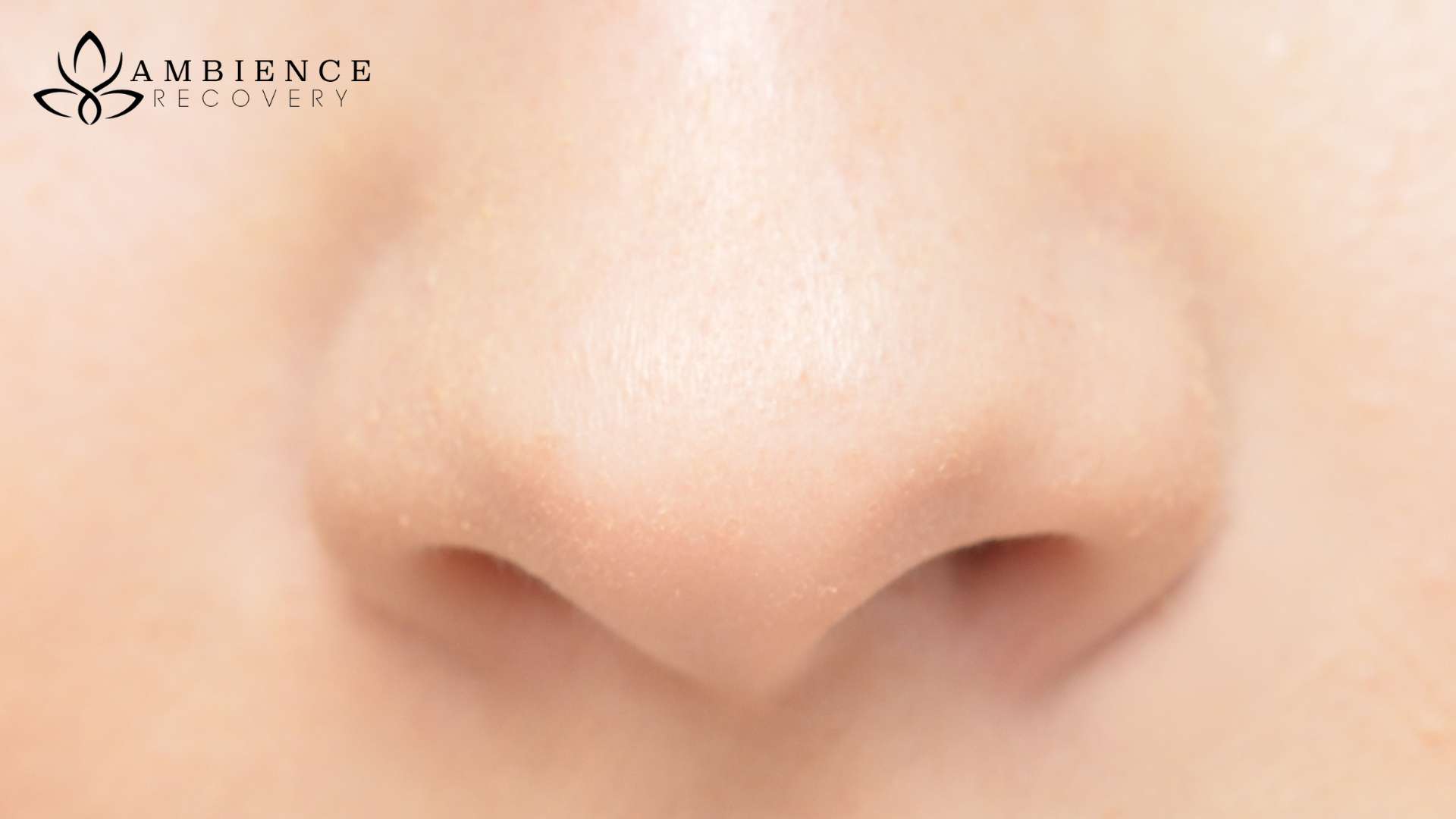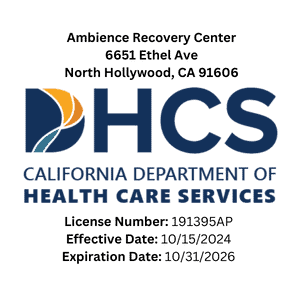Key Takeaways
- Cocaine use, especially snorting, damages the nasal passages and causes frequent nosebleeds.
- “Coke nose” is a term used to describe severe, long-term nasal damage from chronic cocaine use.
- Professional addiction treatment can help individuals recover from cocaine addiction and related health issues.
Introduction
Cocaine, a powerful stimulant drug, is often associated with severe physical and psychological harm. One of the most visible and painful consequences of cocaine use is its impact on the nose.
Frequent snorting of cocaine damages the nasal tissues, leading to recurring nosebleeds and long-term damage known as “coke nose.” This article explores why cocaine causes nosebleeds, the dangers of coke nose, and the importance of seeking treatment for cocaine addiction.
How Does Snorting Cocaine Affect the Nose?
Cocaine’s effects on the nose are a direct result of how the drug interacts with the body’s blood vessels and tissues.
Mechanism of Action
When snorted, cocaine constricts blood vessels in the nasal passages. This reduces blood flow, which deprives tissues of oxygen and essential nutrients. Over time, these tissues weaken and break down.
Immediate Effects
Even short-term use can irritate the sensitive lining of the nose. Users may experience a runny nose, nasal discomfort, or mild bleeding after a single use.
Why This Happens
The repeated irritation caused by snorting cocaine creates small tears in the nasal tissue. Combined with reduced blood flow, this can lead to nosebleeds and other complications.
What is Coke Nose?
Coke nose is a term that describes chronic nasal damage caused by prolonged cocaine use.
Symptoms of Coke Nose
- Persistent runny nose.
- Frequent nosebleeds that may occur without warning.
- Loss of the sense of smell.
- Pain or discomfort in the nasal area.
Severity of Nasal Damage
Over time, the damage can progress to perforation of the nasal septum—the wall separating the two nostrils. This may lead to infections, scarring, and visible deformities.
How it Develops
The severity of the coke nose depends on factors such as the frequency of use, the purity of the cocaine, and whether any medical intervention has been sought. Chronic use without addressing the damage can cause irreversible harm.
Short-Term and Long-Term Effects of Cocaine Use on the Nose
Cocaine use impacts the nose in both immediate and long-lasting ways.
Short-Term Effects
- Irritation and inflammation of the nasal tissues.
- Swelling can make it difficult to breathe.
- Temporary nosebleeds due to fragile blood vessels.
Long-Term Effects
- Damaged nasal passages cause chronic sinus infections.
- Permanent loss of smell due to nerve damage.
- Severe deformities requiring reconstructive surgery.
The Hidden Dangers
The damage to the nose isn’t just cosmetic. Open wounds in the nasal passages can allow bacteria to enter the bloodstream, increasing the risk of systemic infections.
Why Does Cocaine Cause Nose Bleeds?
Cocaine causes nosebleeds due to its harsh effects on the blood vessels and tissues in the nose.
Impact on Blood Vessels
Cocaine’s vasoconstrictive properties make blood vessels narrow and fragile. This increases the likelihood of rupture during or after use.
Nasal Tissue Damage
Reduced blood flow to nasal tissues leads to necrosis, or tissue death, further weakening the nasal lining. Over time, even minor irritation can cause significant bleeding.
Environmental Factors
The dry, powdery nature of cocaine adds to the irritation. Combined with the repetitive motion of snorting, this creates a perfect storm for frequent nosebleeds.
Seeking Help for Cocaine Addiction
The effects of cocaine on the nose are just one piece of the puzzle. Addressing cocaine addiction requires professional help and a commitment to recovery.
Recognizing the Problem: Signs of Cocaine Addiction
Signs of cocaine addiction include:
- Frequent nosebleeds and nasal discomfort.
- An inability to stop using despite negative consequences.
- Behavioral changes like irritability and social withdrawal.
Treatment Options For Snorting and Injecting Cocaine Addiction
- Medical Detox:
- Safely manage withdrawal symptoms under medical supervision.
- Helps address physical cravings and prepare for further treatment.
- Therapy and Counseling:
- Cognitive Behavioral Therapy (CBT) to identify and change harmful thought patterns.
- Individual and group therapy to build coping skills and emotional resilience.
- Support Groups:
- Programs like Cocaine Anonymous provide community and accountability during recovery.
Healing and Recovery
Stopping cocaine use is the first step toward recovery. Medical treatments, including nasal surgeries, may be necessary to repair severe nasal damage. Professional addiction treatment centers offer holistic care to address both the physical and psychological aspects of addiction.
Conclusion
Cocaine use has severe consequences, particularly for the nose. Frequent snorting can cause chronic nosebleeds, irreversible tissue damage, and long-term health issues like coke nose.
While the damage may seem overwhelming, recovery is possible with the right support and treatment. Taking the first step is crucial for healing and regaining control of your life.
If you or someone you know is struggling with cocaine addiction, call Ambience Recovery at 866-721-7470 today. Our dedicated team is here to help you on your journey to recovery.
FAQs About Cocaine Nose Bleeds & Nose Damage
What is Coke Nose?
Coke nose refers to the chronic damage to nasal tissues caused by repeated cocaine use. Symptoms include frequent nosebleeds, a runny nose, and nasal deformities.
Why Does Cocaine Cause Nosebleeds?
Cocaine constricts blood vessels, making them fragile and prone to rupture. Snorting also irritates nasal tissues, leading to bleeding.
Can Coke Nose Be Treated?
Yes, some damage can heal over time with proper medical care and cessation of cocaine use. Severe cases may require surgery.
How Can I Help Someone Struggling with Cocaine Addiction?
Encourage them to seek professional treatment, provide emotional support, and avoid enabling their behavior.
What Does Cocaine Addiction Treatment Involve?
Treatment includes medical detox, therapy, support groups, and holistic approaches to recovery tailored to individual needs.
Resources
https://www.dea.gov/factsheets/cocaine
https://nida.nih.gov/research-topics/cocaine
https://medlineplus.gov/cocaine.html
https://adf.org.au/drug-facts/cocaine/
Katie is a Licensed Clinical Social Worker who has worked as a primary therapist, supervisor, and now clinical director for SUD/MH treatment centers for the past 12 years. Katie is trained in Brainspotting, EMDR, Internal Family Systems and Dialectical Behavior Therapy and is passionate about treating substance use disorders, trauma and grief.






